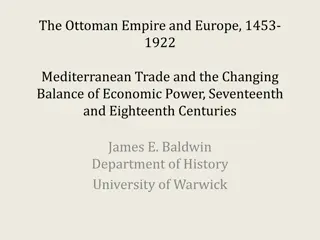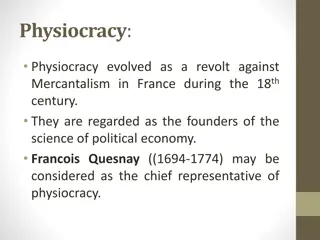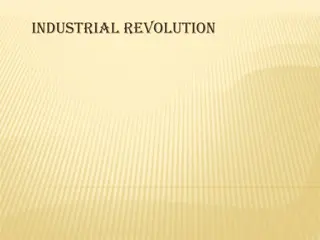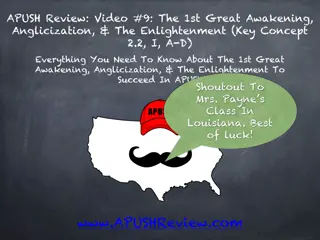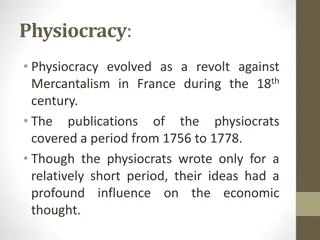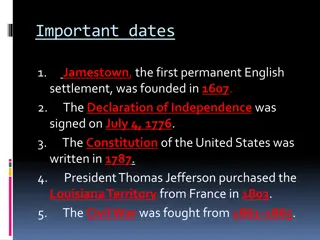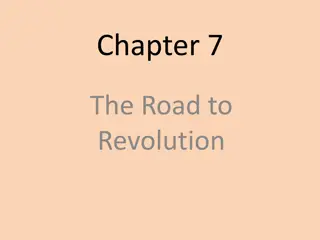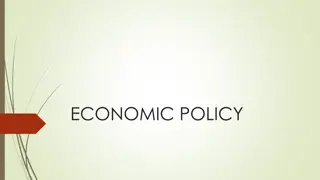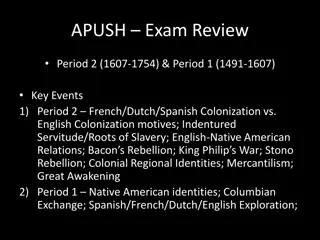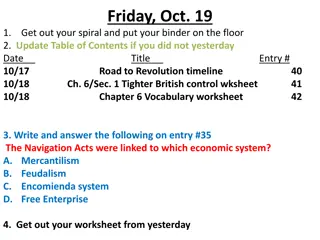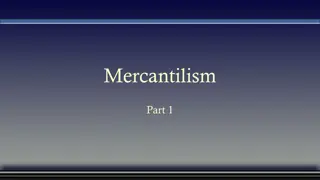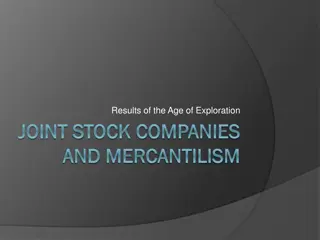Ottoman-European Economic Relations and Mercantilism in the 16th Century
The Ottoman Empire and Europe traded various goods in the 16th century, with a negative trade balance favoring the Ottomans. Institutional innovations like the Joint-Stock Company and the Levant Company emerged to facilitate trade and secure better terms. Mercantilist policies were implemented to re
2 views • 15 slides
Understanding Physiocracy: The Economic Philosophy of Francois Quesnay
Physiocracy emerged as a response to Mercantilism in 18th century France, with Francois Quesnay as a key figure. The basic principles of Physiocracy include the belief in natural order, advocacy of laissez-faire, emphasis on agriculture as the only productive occupation, support for private property
4 views • 14 slides
The Impact of Industrial Revolution on Society
The Industrial Revolution, spanning from 1760 to 1870, revolutionized manufacturing processes, transitioning from hand production to machines, introducing new chemical and iron production methods, and the use of steam power. It began in England and caused radical societal changes, leading to the ris
1 views • 34 slides
The 1st Great Awakening, Anglicization, & The Enlightenment in APUSH
This content covers key concepts in APUSH related to the 1st Great Awakening, Anglicization, and the Enlightenment. It discusses the religious revival, emergence of new sects, Enlightenment ideas, Anglicization of the colonies, and Britain's mercantilism and imperial aims. The impacts on colonial so
0 views • 10 slides
The Rise of Physiocracy in 18th Century France
Physiocracy emerged in 18th century France as a response to the shortcomings of Mercantilism, focusing on agricultural prosperity and natural economic principles. Led by prominent thinkers like Francois Quesnay and Turgot, physiocrats challenged the prevailing economic system, influenced Adam Smith,
0 views • 9 slides
Key Historical Events and Concepts in American History
Learn about important dates, places, events, and vocabulary that shaped American history, including the founding of Jamestown in 1607, the Declaration of Independence in 1776, the Civil War, and key concepts like mercantilism and manifest destiny.
0 views • 25 slides
Exploring Early American Civilizations and European Impact
Discover the Columbian Exchange, Early American Civilizations like Aztec, Inca, and Maya, Inca civilization characteristics, European Exploration impact on Native Americans, and motives for European Expansionism. Learn about technologies aiding European exploration and the economic concept of mercan
0 views • 26 slides
The Road to Revolution: Beginning Causes and Impact of Mercantilism
The road to the American Revolution started with the colonists feeling a sense of independence from Britain and being impacted by mercantilism. Mercantilism led to restrictions on trade, enforcement of Navigation Laws, and economic hardships for the colonies, but also provided some benefits such as
0 views • 26 slides
Impact of Industrial Revolution on Andhra under British Rule
The Industrial Revolution in England had significant repercussions on Andhra under British rule, leading to a decline in local industries, exploitation of resources, and economic setbacks. Due to England's mercantilism, Andhra suffered the loss of self-sufficiency and prosperity, with industries bei
0 views • 12 slides
Colonization Test Review - Mr. Shaffer 2015
Explore key terms related to colonization including joint-stock companies, plantations, indentured servants, indigo, mercantilism, Middle Passage, toleration, charter, apprentice, and more. Enhance your understanding of the colonial era with this comprehensive review.
0 views • 51 slides
Overview of Economic Policy: From Mercantilism to Present-Day Practices
Explore the concept of economic policy and its importance in achieving economic objectives. Delve into the historical debate on state intervention in the economy and major schools of economic theory like Mercantilism. Understand the emergence of economic policies through economic, political, scienti
0 views • 105 slides
Key Events in Early American Colonization: Motives, Interactions, and Consequences
Early American colonization during Periods 1 and 2 (1491-1754) involved various European powers establishing settlements in the New World. Driving factors included economic interests, the use of indentured servitude and the roots of slavery, complex relations with Native Americans, and significant e
0 views • 40 slides
Colonial Challenges Under British Rule
In this academic material, students are instructed to update the Table of Contents and engage with resources related to tighter British control over the colonies. The tasks include exploring historical events like the Proclamation Act of 1763, Quartering Act, Sugar Act, Stamp Act, Declaratory Act, a
0 views • 18 slides
Understanding Mercantilism: Trade, Wealth, and Government Intervention
Studying mercantilism raises questions about trade between countries, the significance of trade surpluses, monetary growth, government's economic roles, industry versus agriculture, and industry protection. Notable figures who contributed to mercantilism include Thomas Mun, Edward Misseldon, John Lo
0 views • 16 slides
Economic Impact of Joint Stock Companies and Mercantilism During the Age of Exploration
The Age of Exploration led to the rise of Joint-Stock Companies, a precursor to modern corporations, which allowed pooling of wealth for overseas ventures. This era also saw the emergence of Mercantilism, a policy focusing on accumulating wealth through favorable trade balances and colonial exploita
0 views • 10 slides
Impact of European Exploration and Colonization on Global Economies
European exploration and colonization led to significant changes in economies and cultures worldwide. While creating the first global economy, it brought positive effects such as economic growth and increased trade, but also negative consequences like the loss of indigenous populations and exploitat
0 views • 39 slides
